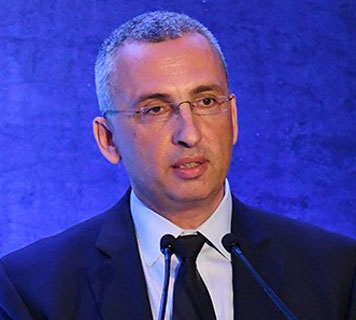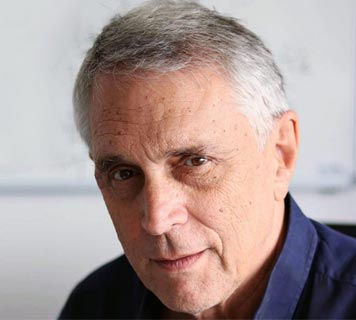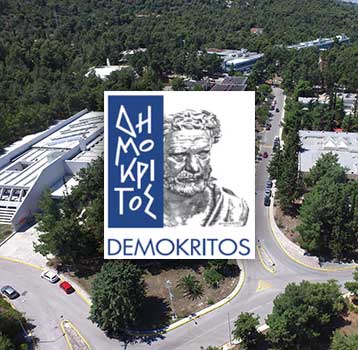 3 days, 6 sessions
3 days, 6 sessions
UniversalAIcourse
July 3 - 5, 2023 | NCSR “Demokritos” Congress Centre Universal AI and its applications in science, engineering, humanities, law, medicine and art. 2023 HIAS Summer EventsWelcome
HIAS Universal AI Course
Hellenic Institute of Advanced Studies (HIAS) welcomes you to a three-day course on universal Artificial Intelligence (AI) and its applications. The goal of this course is to introduce students from all backgrounds including science and engineering as well as law, medicine, social sciences, humanities and the arts, to the latest developments in AI and its potential to revolutionize various fields.
As the world becomes increasingly digitized, AI has the power to transform how we live and work. It is an exciting time to be exploring the possibilities of AI, and this course will provide a forum for undertsanding and discussing these possibilities with experts from various fields.
Throughout the 3 days of the course lectures and applications, we will explore how AI can be applied to various disciplines, such as science, engineering, humanities, law, medicine, and art. AI is already being used in these fields to automate processes, analyze data, and assist with decision-making. However, there is still much potential to be realized, both opportunities and risks and we will present how AI can be harnessed to achieve even greater outcomes. Moreover, we will discuss the ethical considerations of using AI in these fields and the potential impact on society.
In addition to the keynote instructors, we are delighted to bring together a diverse group of experts from hellenic and overseas academia to share their experiences and insights. Our speakers will discuss the latest trends in AI, the challenges of developing AI applications, and the opportunities and benefits of using AI in different fields.
We invite you to participate actively in the discussions and ask questions to gain a deeper understanding of the possibilities and limitations of AI. By the end of this course, we hope you will have gained a comprehensive understanding of the latest developments in AI and its potential to transform the world we live in.
- Registration to the Course is free of charge. -
people
Instructors
Dimitris Bertsimas
MIT

Dimitris Bertsimas
Professor, Massachusetts Institute of Technology
Dimitris Bertsimas is the Boeing Professor of Operations Research and the Associate Dean of Business Analytics at the Massachusetts Institute of Technology. He is a member of the US National Academy of Engineering, an INFORMS fellow, recipient of Franz Edelman Prize four times and the INFORMS President's Award, among many other research and teaching awards, supervisor of 88 completed and 25 current doctoral theses, editor of the INFORMS Journal on Optimization and co-founder of ten analytics companies and two foundations.
Giorgos Stamou
NTUA

Giorgos Stamou
Professor, National Technical University of Athens
Giorgos Stamou is a Professor of the School of Electrical and Computer Engineering, National Technical University of Athens, Director of Artificial Intelligence and Machine Learning Systems Laboratory (AILS Lab) and the founding Director of the MSc “Data Science and Machine Learning” of National Technical University of Athens (from 2018 until 2022).
He has been working in more than 60 funded research projects in the areas of knowledge representation, automated reasoning, machine learning and ΑΙ applications, in many of them as the scientific coordinator. He has published more than 150 papers in scientific Journals and Conference Proceedings, co-edited books and one monograph, served as organiser or member of the organisation committees of scientific Conferences and participated in several scientific committees.
Speakers
Ion Androutsopoulos
AUEB

Ion Androutsopoulos
Professor, Athens University of Economics and Business
Ion Androutsopoulos is Professor of Artificial Intelligence and head of the Natural Language Processing Group in the Department of Informatics, Athens University of Economics and Business. His current research interests include: question answering, esp. for biomedical document collections; natural language generation, recently from medical images; text classification, incl. filtering abusive content; information extraction and opinion mining, incl. legal text analytics and sentiment analysis; NLP tools for Greek; machine learning in NLP, esp. deep learning; NLP in digital curation.
Vangelis Karkaletsis
NCSR Demokritos

Vangelis Karkaletsis
Director, Institute of Informatics and Telecommunications- NCSR Demokritos
Vangelis Karkaletsis is Director of the Institute of Informatics & Telecommunications (IIΤ) at NCSR Demokritos, and Member of the National Commission for Bioethics & Technoethics. His research interests are in the areas of content analysis, big data management, knowledge representation, human-machine interaction. Coordinator, scientific and technical manager of many European and national projects and organiser of numerous international conferences, workshops and summer schools. Having been responsible for the Institute's educational activities for more than 10 years, he initiated the joint PhD scholarship programme with several Universities abroad, and launched the MSc in Data Science and MSc in Artificial Intelligence programmes for NCSR Demokritos.
Efthimios Kaxiras
Harvard University

Efthimios Kaxiras
Professor, Harvard University
Efthimios Kaxiras received his PhD in theoretical condensed matter physics from MIT. He has been a faculty member at Harvard University for over 30 years, where he holds the Chair of John Hasbrouck Van Vleck Professor of Pure and Applied Physics and is also Professor of Applied Mathematics in the School of Engineering and Applied Sciences. He served as Chair of the Harvard Physics Department (2020-2023). His research interests encompass a wide range of topics in the physics of solids and fluids, including the development of methods for realistic modeling of materials using multiscale approaches, and Machine Learning methods.
Konstantina Nikita
NTUA

Konstantina Nikita
Professor, National Technical University of Athens
Konstantina Nikita, M.Eng., M.D., Ph.D., is Professor at the School of Electrical and Computer Engineering, National Technical University of Athens and the Irene McCulloch Distinguished Adjunct Professor of Biomedical Engineering and Medicine at Viterbi School of Engineering and Keck School of Medicine, University of Southern California. She is a Fellow of the Institute of Electrical and Electronics Engineers (IEEE), a Founding Fellow of the European Association of Medical and Biological Engineering and Science (EAMBES), and a Fellow of the American Institute of Medical and Biological Engineering (AIMBE). She is the Editor-in-Chief of the IEEE Transactions on Antennas and Propagation.
Her current research interests include intelligent health systems, medical decision support, biomedical informatics, biomedical image computing and analytics, physiological systems modeling and identification, and computational bioelectromagnetics. She has received various awards, among which the Bodossakis Foundation Academic Prize for exceptional achievements in “Theory and Applications of Information Technology in Medicine”.
Georgia Perakis
MIT

Georgia Perakis
Professor, Massachusetts Institute of Technology
Georgia Perakis is the William F. Pounds Professor of Management at the MIT Sloan School, an Associate Dean for SERC (Social and Ethical Responsibility of Computing) in the Schwarzman College of Computing and MIT Sloan, the Co-Director of the Operations Research Center at MIT and the Editor in Chief of the M&SOM journal. Over the years, she has taught in a variety of programs across MIT. For her teaching, she won the Graduate Student Council Teaching Award in 2002, the Jamieson Prize in 2014 for excellence in teaching and the Teacher of the Year award in 2017.
For her research, she has received several awards including the CAREER Award from NSF and the PECASE Award from the Office of the President on Science and Technology. In 2016, she was elected as an INFORMS Fellow, and in 2021 as Distinguished MSOM Fellow.
Perakis has passion supervising students and has graduated thirty PhD and fifty-six Masters students. In 2012, she received the Samuel M. Seegal Award for inspiring student to achieve excellence.
Demetri Psaltis
EPFL

Demetri Psaltis
Professor, École Polytechnique Fédérale de Lausanne
Demetri Psaltis is Professor of Optics and the Director of the Optics Laboratory at the Ecole Polytechnique Federale de Lausanne (EPFL). He was educated at Carnegie-Mellon University where he received the Bachelor of Science in Electrical Engineering and Economics in 1974, the Master's in 1975, and the PhD in Electrical Engineering in 1977. In 1980, he joined the faculty at the California Institute of Technology, in Pasadena, California where he held the Thomas G. Myers Chair in Electrical Engineering. He served as Executive Officer for the Computation and Neural Systems department from 1992-1996. From 1996 until 1999 he was the Director of the National Science Foundation research center on Neuromorphic Systems Engineering at Caltech. In 2004 he established at Caltech the Center for Optofluidic Integration and he served as the director until he moved to EPFL in 2006 where he established his research lab and served as dean of the engineering school for 10 years. His research interests are imaging, machine learning, biophotonics, nonlinear optics, and optofluidics. He has over 400 publications in these areas. Dr. Psaltis is a fellow of the IEEE, the Optical Society of America, the European Optical Society and the Society for Photo-optical Systems Engineering (SPIE). He received the International Commission of Optics Prize, the Humboldt Award, the Leith Medal, the Gabor Prize and the Joseph Fraunhofer Award/Robert M. Burley Prize.
Spyros Raptis
INNOETICS

Spyros Raptis
Head of TTS R&D, INNOETICS Text-to-Speech Technologies
Spyros Raptis is Head of Text-to-Speech R&D at Samsung Hellas. Before joining Samsung he was the Director of the Institute for Language and Speech Processing, “Athena” Research Center, and co-founder of INNOETICS startup company until it was acquired by Samsung Electronics. He holds an MSc and PhD from the National Technical University of Athens. His research interests include speech analysis, modeling and generation, voice assistants and speech-enabled applications and services, tools for accessibility etc.
Haralambos Sarimveis
NTUA

Haralambos Sarimveis
Professor, National Technical University of Athens
Harry Sarimveis received a Diploma in Chemical Engineering from the National Technical University of Athens (NTUA) in 1990 and an MSc and PhD in control engineering and machine learning from Texas A&M University in 1990 and 1992, respectively. In September 2000, he became a Lecturer in the School of Chemical Engineering at NTUA. Since 2016, he has been a Full Professor and heads the "Unit of Process Control and Informatics."
His research interests include mathematical modelling and optimization, automatic control, data analytics and machine learning, and cheminformatics. He has co-authored more than 130 scientific papers.
Theodora Varvarigou
NTUA

Theodora Varvarigou
Professor, National Technical University of Athens
Theodora Varvarigou is a professor at the School of Electrical and Computer Engineering of the National Technical University of Athens (NTUA). Since June 2019, she serves as the Chair of the Board of Directors of Athens Water Supply and Sewerage Company (EYDAP S.A.) which is also listed in the Athens stock exchange.
Her research is making an impact on cutting-edge technologies, such as data analytics, artificial intelligence, machine learning, Cloud computing, big data technologies, IoT technologies, semantic web, social networking technologies etc. She has published more than 500 papers in leading international journals, conferences and books. She has also participated and co-ordinated more than 60 EC projects.
AI COURSE
Program
DAY 1July 3
Predictive AI
Morning Session
Methods
Introduction: Moneyball and Wine Quality
In Lecture 1, we discuss two exciting applications of Machine Learning (ML) in recent history: Moneyball and Wine Quality Prediction. The first example (Moneyball) showcases how ML can outperform or complement human expertise in applications that traditionally have depended only on human reasoning and intuition. The second example (Wine Quality Prediction) concerns linear regression models, specifically how regression models can be used for predicting wine quality (the specific example was developed by Princeton economics professor Orley Ashenfelter).
Dimitris Bertsimas
Predictive AI: The Framingham Heart Study and the Supreme Court
In Lecture 2, we discuss how ML can be used in critical applications for humans, in areas like health and law, for building prediction models. First, we present ML can be used to model the expertise of a physician and predict the quality of healthcare. Through this example, we will introduce the method of logistic regression. We further discuss the Framingham Heart Study, which led to one of the top 10 cardiology advances of the 1900s and paved the way for clinical decision rules. Second, we discuss how a group of academics predicted the outcomes of United States Supreme Court cases. Through this example, we will discuss the analytical methods of CART, Optimal Classification Trees, and Random Forests, and then use data for Supreme Court cases to build models.
Dimitris Bertsimas
Interpretability: Optimal Classification Trees
In Lecture 3, we discuss interpretability in artificial intelligence more broadly and present an optimal classification tree for predicting morbidity and mortality in emergency surgeries and in oncology, prioritizing liver transplantations, predicting life events.
Dimitris Bertsimas
Afternoon Session
Applications
In the first AI in practice session, we will introduce modern AI tools (Jupyter notebooks, Python) and use them to build and evaluate ML models for prediction, based on the Framingham Heart Study application.
Giorgos Stamou
The lecture showcases how a shift from the traditional representation model for a certain class of problems can move the solution space into a different computer science domain and benefit from its widely used and acceptable solutions. The investigated case is the classification of trajectories using computer vision techniques.
Theodora Varvarigou
AI for Materials: Discovery and Exploration
We will discuss Machine Learning methods for efficiently organizing a vast amount of first-principles quantum-mechanical calculations into tools that can predict novel materials, and can describe their properties under many different realistic conditions.
Efthimios Kaxiras
AI-on-Demand Platform (AIoD) and Earth Observation
The AI-on-Demand Platform (AIoD) is a community-driven channel designed to empower European research and innovation in Artificial Intelligence (AI), while ensuring the European seal of quality, trustworthiness and explainability. AI4Copernicus project, aims to bridge Artificial Intelligence with Earth Observation (EO) world by making the AIoD platform the platform of choice for users of EO data along the value chain (scientists, SMEs, non-tech sector). The lecture showcases the use of AI within various EO applications, including security, food and agriculture, energy, environment and other domains.
Vangelis Karkaletsis
DAY 2July 4
Prescriptive AI
Morning Session
Methods
Clustering: Customer segmentation
In Lecture 4, we present clustering methods for customer segmentation. We present two types of clustering methods – k-mean clustering and hierarchical clustering– for customer segmentation. We further discuss how to combine clustering and trees to improve predictability in the context of heart attacks.
Dimitris Bertsimas
Prescriptive AI: Movie recommenders
In Lecture 5, we present how we can use models for predictions to make decisions (prescriptive AI). We apply this framework in the context of a large multimedia company
Dimitris Bertsimas
Big Data and Knowledge: Movie recommenders revisited
In Lecture 6 we discuss the role of big data in the development of prescriptive AI. Based on the example of movie recommenders we introduce modern AI technologies for data representation, integration, enrichment, search and analysis and their impact in decision making.
Giorgos Stamou
Afternoon Session
Applications
In the second AI in practice session, we present the development of prescriptive ML models based on Decision Trees.
Giorgos Stamou
Artificial intelligence in drugs and materials design: Electronic representations of substances, development of predictive models and de novo design using generative AI and reinforcement learning technologies.
Haralambos Sarimveis
Emerging AI-empowered health ecosystems
Advances in wireless, wearable, and ambient technologies, coupled with advanced data analytics and simulation techniques open-up new opportunities for optimizing treatment and facilitating effective self-disease management. The integration of heterogeneous data sources with existing pathophysiological knowledge and disease models can fuel informed, accurate diagnosis, timely prognosis, and tailored interventions, underpinning precision medicine. In this talk, we will outline approaches for the efficient integration of multidimensional, heterogeneous data and present AI-empowered approaches for disease modelling and clinical decision making that are deployed towards enhancing clinical and well-being outcomes.
Konstantina Nikita
We will discuss how machine learning is used to design and operate computational imaging systems in the optical domain. In particular we will focus on physics inspired approached for training neural networks. We will also discuss the optical computers for the power efficient implementation of neural networks.
Demetri Psaltis
DAY 3July 5
Multimodal AI
Morning Session
Methods
Deep Learning: Text and image recognition
In Lecture 7, we present deep learning, a widely used methodology for computer vision, automatic translation and language recognition. We present applications in the context of text and image recognition.
Dimitris Bertsimas
Multi-modal AI: Holistic AI for medicine
In Lecture 8, we present predictive models based on deep learning that combine computer vision, language and tabular data. We present two applications: Prediction of Hurricanes and Holistic AI for Medicine.
Dimitris Bertsimas
Generative Models: Creative AI
In Lecture 9, we discuss deep learning models that generate new data. Based on the example of image, text and music generation, we discuss how novel generative models can create new data based on very high-order data representations.
Giorgos Stamou
Afternoon Session
Applications
Pretrained Transformer models for Natural Language Processing (NLP), fine-tuning and prompting them, NLP applications in the biomedical and legal domains and social media.
Ion Androutsopoulos
Machine learning has brought a major shift in speech processing, leading to significant breakthroughs and human parity in problems that were previously considered hard. We will discuss how ML is used to model and to generate speech in the context of modern voice-user-interfaces and virtual assistants, offering new ways to approach and to control prosody, style, and identity. We’ll also look into some of its applications such as expressive, multi-lingual, and emotional speech synthesis, singing speech synthesis and, even, voice cloning, along with the ethical issues that arise.
Spyros Raptis
Artificial Intelligence, especially generative machine learning models have been lately used in the area of creative systems and art. We will see how modern AI technologies can be used in music analysis and synthesis, providing artists with novel tools advancing music expression.
Giorgos Stamou
We discuss the ethical issues raised from the application of AI technologies. Starting from the potential of modern machine learning to amplify and scale the human and data biases at an unprecedented rate, we discuss important concerns and consequences of AI applications and possible guidelines that could regulate the design and use of artificial intelligence.
Georgia Perakis
Venue Information
Venue

Central Auditorium
Patr. Gregoriou E & 27 Neapoleos Str
15341 Agia Paraskevi



